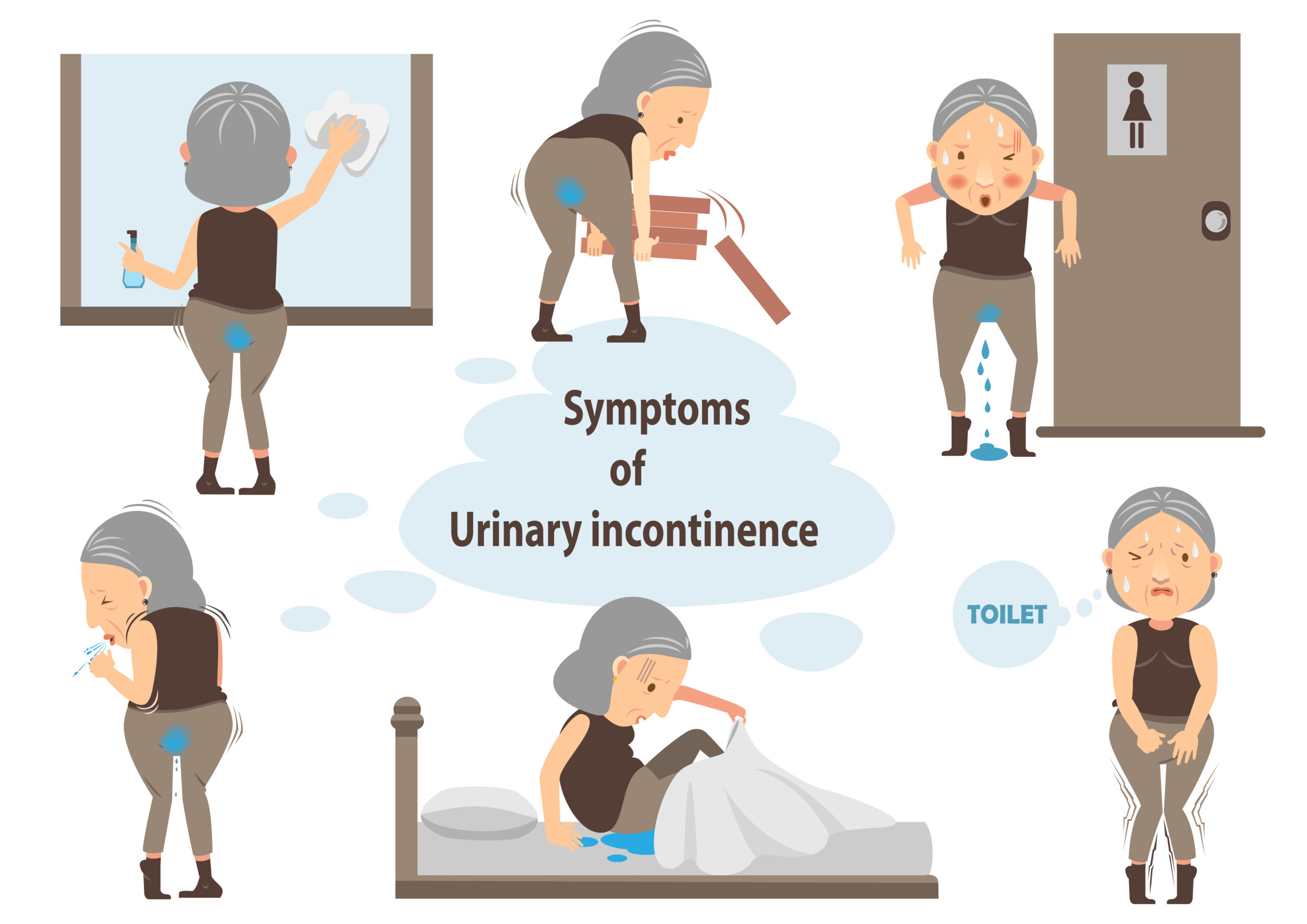Say No to Incontinence with High-Intensity Focused Electromagnetic Technology
Urinary incontinence is a frequently overlooked condition, often brushed aside with the assumption that it will resolve spontaneously. This perception fosters negligence, allowing it to evolve into a chronic issue that detrimentally impacts both physical and mental health, as well as daily life. Globally, approximately 200 million women experience urinary leakage, yet 5 out of 10 do not seek treatment. On average, individuals wait for about 6.5 years before seeking their first treatment for symptoms.
 Dr. Patraporn Tangkiratichai, our obstetrician-gynecologist and reproductive medicine specialist at Bangkok Hospital Hua Hin, explains that the primary cause of urinary incontinence is abnormalities in the organs controlling urination, both functionally and physically. This condition can affect individuals of any gender and age, impacting the nervous system’s control of urination, the bladder, urinary tract, sphincter muscles, and pelvic floor muscles. Factors contributing to urinary incontinence include urinary tract infections, weakened pelvic floor muscles, bladder growths, weak urethral sphincters, aging, childbirth, menopause, hormonal imbalances in women, prostate issues in men, chronic coughing, or constipation. Studies show that 54% of individuals with urinary incontinence experience a loss of confidence in their daily lives, and 45% report strain in their relationships.
Dr. Patraporn Tangkiratichai, our obstetrician-gynecologist and reproductive medicine specialist at Bangkok Hospital Hua Hin, explains that the primary cause of urinary incontinence is abnormalities in the organs controlling urination, both functionally and physically. This condition can affect individuals of any gender and age, impacting the nervous system’s control of urination, the bladder, urinary tract, sphincter muscles, and pelvic floor muscles. Factors contributing to urinary incontinence include urinary tract infections, weakened pelvic floor muscles, bladder growths, weak urethral sphincters, aging, childbirth, menopause, hormonal imbalances in women, prostate issues in men, chronic coughing, or constipation. Studies show that 54% of individuals with urinary incontinence experience a loss of confidence in their daily lives, and 45% report strain in their relationships.
 The treatment of urinary incontinence varies depending on the underlying cause of the condition, as it may involve impairment in different areas. Physicians may recommend a range of interventions, including behavioral therapy, medication, vaginal pessaries, radiofrequency therapy, electromagnetic therapy, or, as a last resort, surgical intervention.
There is currently innovative technology known as High-Intensity Focused Electromagnetic (HIFEM), which aims to stimulate the nervous system and exercise muscles, specifically targeting pelvic muscles. This technology utilizes high-energy waves to induce muscle contractions at a level significantly higher than normal contractions. Remarkably, just one session is equivalent to performing 11,000 Kegel exercises. HIFEM therapy is designed to strengthen pelvic floor muscles effectively to address urinary incontinence issues. This treatment approach is standardized, research-backed, non-invasive, and convenient, as patients simply need to sit and remain fully dressed during sessions. Moreover, there is no required recovery time, allowing patients to resume their normal activities immediately.
The treatment of urinary incontinence varies depending on the underlying cause of the condition, as it may involve impairment in different areas. Physicians may recommend a range of interventions, including behavioral therapy, medication, vaginal pessaries, radiofrequency therapy, electromagnetic therapy, or, as a last resort, surgical intervention.
There is currently innovative technology known as High-Intensity Focused Electromagnetic (HIFEM), which aims to stimulate the nervous system and exercise muscles, specifically targeting pelvic muscles. This technology utilizes high-energy waves to induce muscle contractions at a level significantly higher than normal contractions. Remarkably, just one session is equivalent to performing 11,000 Kegel exercises. HIFEM therapy is designed to strengthen pelvic floor muscles effectively to address urinary incontinence issues. This treatment approach is standardized, research-backed, non-invasive, and convenient, as patients simply need to sit and remain fully dressed during sessions. Moreover, there is no required recovery time, allowing patients to resume their normal activities immediately.
 95% of individuals undergoing this treatment report significant improvement in their quality of life. The recommended treatment plan typically consists of five sessions, each lasting 28 minutes, with sessions conducted 2-3 times per week and at least one day of rest between sessions. While immediate results may not be apparent, there is usually sustained improvement over time, and the positive effects can persist for up to 6 months post-treatment.
However, it is important to note that this treatment may not be suitable for everyone. It is advised to avoid this treatment in individuals with certain conditions, including cancer, tumors, heart disease, pacemaker implants, metal or electronic devices in the body, incomplete bone healing, respiratory issues, anticoagulant use, bleeding risk, during menstruation, fever, pregnancy, or individuals undergoing IVF. Additionally, those with copper or stainless steel IUDs or recent muscle surgery should also avoid this treatment.
Moreover, High-Intensity Focused Electromagnetic Therapy not only treats urinary incontinence but also addresses perineal laxity and sexual dysfunction in both men and women. In men, it can be applied to manage premature ejaculation, complementing the comprehensive care provided by urology specialists.
95% of individuals undergoing this treatment report significant improvement in their quality of life. The recommended treatment plan typically consists of five sessions, each lasting 28 minutes, with sessions conducted 2-3 times per week and at least one day of rest between sessions. While immediate results may not be apparent, there is usually sustained improvement over time, and the positive effects can persist for up to 6 months post-treatment.
However, it is important to note that this treatment may not be suitable for everyone. It is advised to avoid this treatment in individuals with certain conditions, including cancer, tumors, heart disease, pacemaker implants, metal or electronic devices in the body, incomplete bone healing, respiratory issues, anticoagulant use, bleeding risk, during menstruation, fever, pregnancy, or individuals undergoing IVF. Additionally, those with copper or stainless steel IUDs or recent muscle surgery should also avoid this treatment.
Moreover, High-Intensity Focused Electromagnetic Therapy not only treats urinary incontinence but also addresses perineal laxity and sexual dysfunction in both men and women. In men, it can be applied to manage premature ejaculation, complementing the comprehensive care provided by urology specialists.
 “Urinary incontinence can result from both physiological issues and lifestyle behaviors, impacting bladder function and, consequently, urinary incontinence. The key solution lies in adjusting behaviors. Maintain a recommended water intake of 8-10 glasses daily, avoiding excessive consumption before bedtime. Steer clear of prolonged urine retention and establish regular, scheduled urination to manage symptoms effectively. For those experiencing urinary incontinence, seeking advice from a specialist is crucial for personalized treatment, preventing worsening symptoms and preserving quality of life.” Dr. Patraporn concluded.
**************************************************************************
For more information and booking an appointment, please contact :
Tel. 032-616-800 Call Center, Bangkok Hospital Hua Hin
Tel: 032-616-884 (8.00 – 17.00 hrs.) OBGYN Department, 3rd floor
News & Information >> Line ID : @bangkokhuahin
“Urinary incontinence can result from both physiological issues and lifestyle behaviors, impacting bladder function and, consequently, urinary incontinence. The key solution lies in adjusting behaviors. Maintain a recommended water intake of 8-10 glasses daily, avoiding excessive consumption before bedtime. Steer clear of prolonged urine retention and establish regular, scheduled urination to manage symptoms effectively. For those experiencing urinary incontinence, seeking advice from a specialist is crucial for personalized treatment, preventing worsening symptoms and preserving quality of life.” Dr. Patraporn concluded.
**************************************************************************
For more information and booking an appointment, please contact :
Tel. 032-616-800 Call Center, Bangkok Hospital Hua Hin
Tel: 032-616-884 (8.00 – 17.00 hrs.) OBGYN Department, 3rd floor
News & Information >> Line ID : @bangkokhuahin
 Dr. Patraporn Tangkiratichai, our obstetrician-gynecologist and reproductive medicine specialist at Bangkok Hospital Hua Hin, explains that the primary cause of urinary incontinence is abnormalities in the organs controlling urination, both functionally and physically. This condition can affect individuals of any gender and age, impacting the nervous system’s control of urination, the bladder, urinary tract, sphincter muscles, and pelvic floor muscles. Factors contributing to urinary incontinence include urinary tract infections, weakened pelvic floor muscles, bladder growths, weak urethral sphincters, aging, childbirth, menopause, hormonal imbalances in women, prostate issues in men, chronic coughing, or constipation. Studies show that 54% of individuals with urinary incontinence experience a loss of confidence in their daily lives, and 45% report strain in their relationships.
Dr. Patraporn Tangkiratichai, our obstetrician-gynecologist and reproductive medicine specialist at Bangkok Hospital Hua Hin, explains that the primary cause of urinary incontinence is abnormalities in the organs controlling urination, both functionally and physically. This condition can affect individuals of any gender and age, impacting the nervous system’s control of urination, the bladder, urinary tract, sphincter muscles, and pelvic floor muscles. Factors contributing to urinary incontinence include urinary tract infections, weakened pelvic floor muscles, bladder growths, weak urethral sphincters, aging, childbirth, menopause, hormonal imbalances in women, prostate issues in men, chronic coughing, or constipation. Studies show that 54% of individuals with urinary incontinence experience a loss of confidence in their daily lives, and 45% report strain in their relationships.
 The treatment of urinary incontinence varies depending on the underlying cause of the condition, as it may involve impairment in different areas. Physicians may recommend a range of interventions, including behavioral therapy, medication, vaginal pessaries, radiofrequency therapy, electromagnetic therapy, or, as a last resort, surgical intervention.
There is currently innovative technology known as High-Intensity Focused Electromagnetic (HIFEM), which aims to stimulate the nervous system and exercise muscles, specifically targeting pelvic muscles. This technology utilizes high-energy waves to induce muscle contractions at a level significantly higher than normal contractions. Remarkably, just one session is equivalent to performing 11,000 Kegel exercises. HIFEM therapy is designed to strengthen pelvic floor muscles effectively to address urinary incontinence issues. This treatment approach is standardized, research-backed, non-invasive, and convenient, as patients simply need to sit and remain fully dressed during sessions. Moreover, there is no required recovery time, allowing patients to resume their normal activities immediately.
The treatment of urinary incontinence varies depending on the underlying cause of the condition, as it may involve impairment in different areas. Physicians may recommend a range of interventions, including behavioral therapy, medication, vaginal pessaries, radiofrequency therapy, electromagnetic therapy, or, as a last resort, surgical intervention.
There is currently innovative technology known as High-Intensity Focused Electromagnetic (HIFEM), which aims to stimulate the nervous system and exercise muscles, specifically targeting pelvic muscles. This technology utilizes high-energy waves to induce muscle contractions at a level significantly higher than normal contractions. Remarkably, just one session is equivalent to performing 11,000 Kegel exercises. HIFEM therapy is designed to strengthen pelvic floor muscles effectively to address urinary incontinence issues. This treatment approach is standardized, research-backed, non-invasive, and convenient, as patients simply need to sit and remain fully dressed during sessions. Moreover, there is no required recovery time, allowing patients to resume their normal activities immediately.
 95% of individuals undergoing this treatment report significant improvement in their quality of life. The recommended treatment plan typically consists of five sessions, each lasting 28 minutes, with sessions conducted 2-3 times per week and at least one day of rest between sessions. While immediate results may not be apparent, there is usually sustained improvement over time, and the positive effects can persist for up to 6 months post-treatment.
However, it is important to note that this treatment may not be suitable for everyone. It is advised to avoid this treatment in individuals with certain conditions, including cancer, tumors, heart disease, pacemaker implants, metal or electronic devices in the body, incomplete bone healing, respiratory issues, anticoagulant use, bleeding risk, during menstruation, fever, pregnancy, or individuals undergoing IVF. Additionally, those with copper or stainless steel IUDs or recent muscle surgery should also avoid this treatment.
Moreover, High-Intensity Focused Electromagnetic Therapy not only treats urinary incontinence but also addresses perineal laxity and sexual dysfunction in both men and women. In men, it can be applied to manage premature ejaculation, complementing the comprehensive care provided by urology specialists.
95% of individuals undergoing this treatment report significant improvement in their quality of life. The recommended treatment plan typically consists of five sessions, each lasting 28 minutes, with sessions conducted 2-3 times per week and at least one day of rest between sessions. While immediate results may not be apparent, there is usually sustained improvement over time, and the positive effects can persist for up to 6 months post-treatment.
However, it is important to note that this treatment may not be suitable for everyone. It is advised to avoid this treatment in individuals with certain conditions, including cancer, tumors, heart disease, pacemaker implants, metal or electronic devices in the body, incomplete bone healing, respiratory issues, anticoagulant use, bleeding risk, during menstruation, fever, pregnancy, or individuals undergoing IVF. Additionally, those with copper or stainless steel IUDs or recent muscle surgery should also avoid this treatment.
Moreover, High-Intensity Focused Electromagnetic Therapy not only treats urinary incontinence but also addresses perineal laxity and sexual dysfunction in both men and women. In men, it can be applied to manage premature ejaculation, complementing the comprehensive care provided by urology specialists.
 “Urinary incontinence can result from both physiological issues and lifestyle behaviors, impacting bladder function and, consequently, urinary incontinence. The key solution lies in adjusting behaviors. Maintain a recommended water intake of 8-10 glasses daily, avoiding excessive consumption before bedtime. Steer clear of prolonged urine retention and establish regular, scheduled urination to manage symptoms effectively. For those experiencing urinary incontinence, seeking advice from a specialist is crucial for personalized treatment, preventing worsening symptoms and preserving quality of life.” Dr. Patraporn concluded.
**************************************************************************
For more information and booking an appointment, please contact :
Tel. 032-616-800 Call Center, Bangkok Hospital Hua Hin
Tel: 032-616-884 (8.00 – 17.00 hrs.) OBGYN Department, 3rd floor
News & Information >> Line ID : @bangkokhuahin
“Urinary incontinence can result from both physiological issues and lifestyle behaviors, impacting bladder function and, consequently, urinary incontinence. The key solution lies in adjusting behaviors. Maintain a recommended water intake of 8-10 glasses daily, avoiding excessive consumption before bedtime. Steer clear of prolonged urine retention and establish regular, scheduled urination to manage symptoms effectively. For those experiencing urinary incontinence, seeking advice from a specialist is crucial for personalized treatment, preventing worsening symptoms and preserving quality of life.” Dr. Patraporn concluded.
**************************************************************************
For more information and booking an appointment, please contact :
Tel. 032-616-800 Call Center, Bangkok Hospital Hua Hin
Tel: 032-616-884 (8.00 – 17.00 hrs.) OBGYN Department, 3rd floor
News & Information >> Line ID : @bangkokhuahin